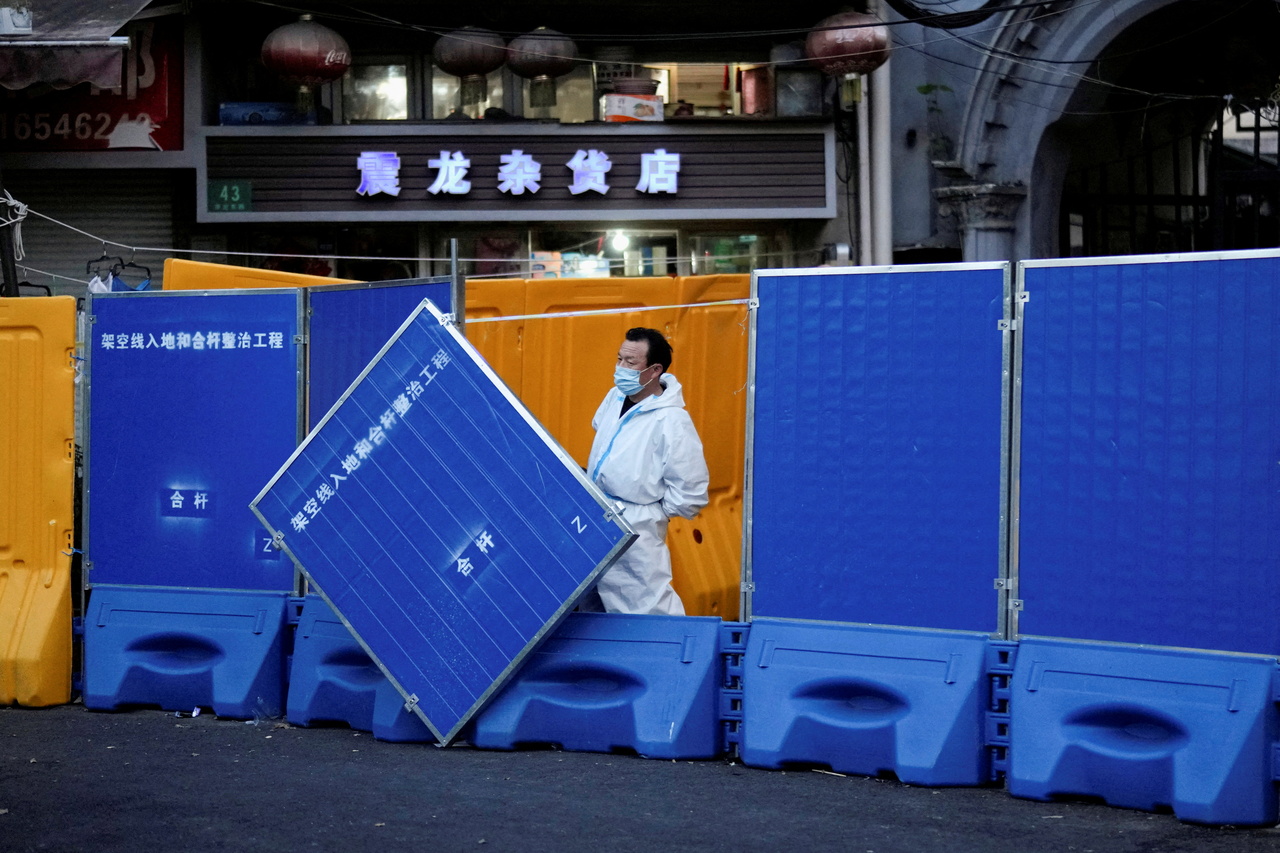'We can't let our guard down,' Chinese health official tells Shanghai residents under lockdown
Sign up now: Get insights on Asia's fast-moving developments

A worker in a protective suit keeps watch next to barricades during the lockdown in Shanghai on April 11, 2022.
PHOTO: REUTERS
SHANGHAI (NYTIMES) - To Shanghai residents who have reached the limit of their patience with a lockdown that has kept them stuck at home for two weeks, a top health official has a message: "We cannot let our guard down."
Despite reports that the shutdown of daily life in Shanghai has caused food shortages and reduced access to medical care, Dr Liang Wannian, a senior official at China's National Health Commission, said on Sunday (April 10) that the lockdown was the best way to ensure "people first, lives first".
Under the country's zero-Covid strategy, Shanghai and more than a dozen other cities in China are under full or partial lockdowns to tackle spikes in omicron cases of the coronavirus.
The lockdowns are exposing a growing social and economic cost of the strategy, which has been abandoned nearly everywhere else in the world.
Other countries have lifted most restrictions, but "lying flat is not an option for China", Dr Liang said, referring to the phenomenon of "lying flat", or relaxing, in the face of a challenge.
China's relatively low vaccination rate among older people and its limited health care resources for treating severe cases continue to worry officials and keep them from easing pandemic restrictions. There are around 264 million people age over 60 in China, and some 40 million of them have not been vaccinated against the coronavirus.
Infections among this group were inevitable, Dr Liang said, but "we have to take it seriously". He spoke in an interview with Chinese state media.
Health authorities reported 27,419 new locally transmitted cases in China on Monday, most of them in Shanghai, a city of 26 million. That case count is small compared with many countries, but the recent surge, fuelled by the Omicron variant, is the biggest that China has experienced so far.
China has reported more than 200,000 locally transmitted coronavirus cases in Shanghai since the current outbreak began last month, most of them mild or asymptomatic. The city has just one case that is currently categorised as "severe"; officials said the case required hospital treatment but did not elaborate. No deaths have been reported in the current outbreak.
Mass testing, a key part of China's strategy to eliminate infections, has allowed health authorities to isolate patients who test positive and send them quickly to a hospital or isolation facility.
The southern Chinese city of Guangzhou said last week that it would test all 18 million of its residents, after a small number of locally transmitted cases - fewer than 30 - were reported over the previous seven days.
Officials in Shanghai announced a second round of mass testing for that city's 25 million residents over the weekend.
In the city of Wuhan, where the coronavirus was first reported, officials on Monday began to require residents wishing to use the city's subway to have had a negative result on a nucleic acid test within the past 48 hours. Passengers must show their test result and scan a code from the specific subway car they sit in, so that the authorities can keep track of exposure, according to a notice posted online by the Wuhan Metro on Monday.
Though Dr Liang indicated that China would not back down from its coronavirus strategy, the authorities in Shanghai appeared to respond to a public outcry over the city's handling of the outbreak.
The vice-mayor said on Saturday that the city would begin to lift lockdown measures in neighbourhoods that go 14 days without a new case. On Monday, the city announced a system to categorise districts based on the number of reported positive cases in each.
However, those moves will not do much to mitigate the lockdown's larger economic effect, some economists said.
"The extent of the lockdown is far more serious than people realise," said Mr Bo Zhuang, a China analyst at investment firm Loomis Sayles.
For most of last year, only a few cities in China were under lockdown at any one time, and the economic damage was manageable, Mr Zhuang said. But these days, he estimated, the equivalent of around a quarter of China's economic output is on hold.
"Now we are talking about a couple of provinces under lockdown because of Omicron," Mr Zhuang said. "This would be a risk going forward."
The growing frustration over having daily life disrupted is another risk.
When millions of people in Wuhan learnt on Monday morning about the new rules imposed overnight concerning the city's subway system, many turned to social media to complain.
"Since Wuhan lifted the lockdown two years ago, it has issued the most stringent prevention and control measures," Mr Zhai Haichao, a writer and a businessman, wrote on popular Chinese social media platform Weibo. "It's disturbing that we see no end of the pandemic."


